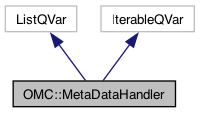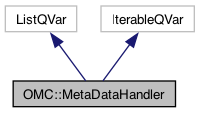
|

|
Provides access to the metadata of a specific object – a node, or a scene.
The MetaDataHandler is used to provide generic metadata from a Node or a Scene. The metadata is created as a key-value pair, and is persistent; it can be saved and loaded as needed with the project.
The MetaDataHandler is iterable and can be accessed with the map[string] operator.
For Scene metadata, see OMH::Scene::metadata.
Print all Metadata in the scene.
Create Some Metadata
For Node Metadata, see OMC::Scene::metadata.
Print all Metadata in the node.
Create Some Metadata
Public Member Functions | |
| virtual bool | contains (const QString &name) const |
| Checks if the provided metadata name exists in the metadata-list. More... | |
| virtual QMap< QString, QVariant > | map () const |
| Converts the dynamic map to a concrete map of names and metadata values . | |
| QList< QVariant > | list () const override |
| Provide a list of metadata key values. | |
| virtual void | remove (const QString &name) |
| Remove a metadata item from the object by name. | |
Public Attributes | |
| QVariant | operator[QString name] |
| Get and set the metadata value. More... | |
|
virtual |
Checks if the provided metadata name exists in the metadata-list.
Checks the list for the provided item. Will return true if the list contains that item. This is also available via the Python built-in check for list object [ contained = object in list ].
| QVariant OMC::MetaDataHandler::operator[QString name] |
Get and set the metadata value.
The map operator is used to get a value by name, and subsequently set it by name.

